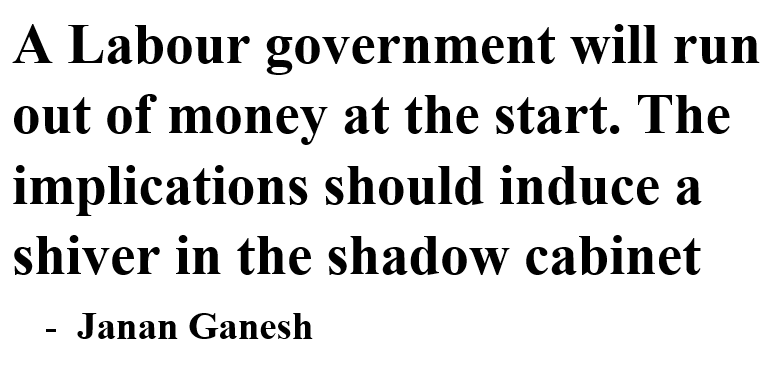By John Pickard
To get a better idea of the thinking of the strategists of capitalism, it is usually best to read the more serious newspapers. When you do that, it is not unusual to find that these more far-sighted and serious thinkers have a similar perspective to Marxists, because they see things as they really are and not how they would like them to be.
One of the regular columnists of the Financial Times, Janan Ganesh, wrote an article in yesterday’s FT that more or less says the same thing that Left Horizons has argued, that this is not 1997. The right wing of the Labour Party, and unfortunately not a few on the left, think Keir Starmer is the new Tony Blair and that Labour will march triumphantly into office in the next election and stay there for thirteen years.
But, as Ganesh puts at the top of his article, “Labour’s progressive dream died along with the Tories’ libertarian one”. It is worth citing chunks of Ganesh’s article to illustrate his general line of argument.
For Starmer, he says quite correctly, “the exorbitant privilege of having Liz Truss as an opponent will soon end. And his party has liabilities of its own that time will expose”. The main problem facing Labour coming to office is the crushing economy crisis, not to say economic emergency.
The Tories would dearly love to be popular and Boris Johnson won the 2019 general election at least partly on the lie that ‘austerity was over’. Jeremy Hunt’s ditching of Kwarteng’s budget and his big hints about “tough decisions” are an indication that the logic of the capitalist system is forcing the Tories into more austerity, despite what may be their wishes.
‘What is the point of a Starmer government?’
As for an incoming Labour administration, Ganesh argues, “Even if Labour wins, there is no social democratic Shangri-La at hand…with little money to spend, the point of the next Labour government is — what, exactly?” Ganesh doesn’t have an answer to his rhetorical question but Marxists do. The ‘point’ of a Starmer government – to the ruling class – is that it is a ‘safe pair of hands’ that can be relied upon to conduct policies that save capitalism, not challenge it.

In a long passage, which we will cite in its entirety, Ganesh explains that Tony Blair was able to use a far more favourable economic climate to introduce a few modest reforms that helped the working class. “When Labour last took office in 1997,” he explains, “the budget was heading towards balance, public debt was 45 per cent of national output and inflation was low. There was scope to borrow in order to spend.
“Even at the time, it felt strange that Labour did not begin the process sooner. Now, on all three counts — the deficit, debt and prices — Starmer is hemmed in. And if he can’t borrow, nor can he raise taxes, at least not much. He will inherit a corporation tax rate that is already going up. The top rate of income tax will be higher than the last Labour government thought appropriate for 12 of its 13 years in office. And this is before the present government raises other levies (value added tax, I suspect), as it surely must”.
Labour will run out of money at the start
That was then, this is now. “Through no fault of its own”, he concludes, “a Labour government will run out of money at the start. The implications should induce a shiver in the shadow cabinet”. Those ‘shivers’ give us a clue as to why so many commitments coming from Shadow ministers at Labour conference were radical only in words: in essence they were vague, ‘aspirational’ and above all, conditional.
What are the likely promises that Starmer will attempt to fulfil, Ganesh asks. “Improvements in healthcare and other services will have to come from structural reform of the kind that unions loathe, not raw cash. Higher benefits for the poor will force the government to economise on state pensions or other kinds of social security”. In other words, what Keir Starmer and Rachel Reeves give with one hand, they will be forced to take back with the other. Ganesh adds, “Labour will hate every minute of it“.
The leadership and Labour MPs might indeed ‘hate’ it, but not nearly as much as the rank and file of the labour movement, and labour voters. Again, Ganesh correctly explains what the result of a Labour government of counter-reforms would be. “Blair tripled NHS spending in cash terms”, he writes, “and still ended up persona non grata with the left. Starmer should brace for a similar fate as a disappointer of millions”.
“Vestiges of the hard left survive”
There would indeed be millions who would be disappointed, starting with the thirteen million, or thereabouts, who will vote Labour. Their disappointment would be transmitted, however imperfectly, through the millions of members in those trade unions affiliated to the Labour Party. This would happen despite the resistance of the right wing union leaders. Not least, the disappointment would filter into the Labour Party membership itself.
Ganesh adds at one point that “Vestiges of the hard left survive in its grassroots, its backbenches, its bureaucracy.” We don’t know about the Labour ‘bureaucracy’, which seems to be completely captured by the hard right of the Party, or the parliamentary party, which has a very narrow basis for the left. But among the membership, and particularly in the trade union affiliates, there is still a strong and viable left, chastened by the victories of the right, but not gone. It is bloody but unbowed.
It is not because we ‘want’ it to be so, but because of the dictates of capitalism that the next Labour government will be a government of crisis from the first day. Janan Ganesh can see that, but it’s a pity that so many in the left cannot.
And it is an important issue, because what are currently the “vestiges” of a “hard left” will be proved by events to have been right all along. And in the debates, discussions and arguments that will follow in the labour movement, they will once again capture mainstream Labour ideas.



